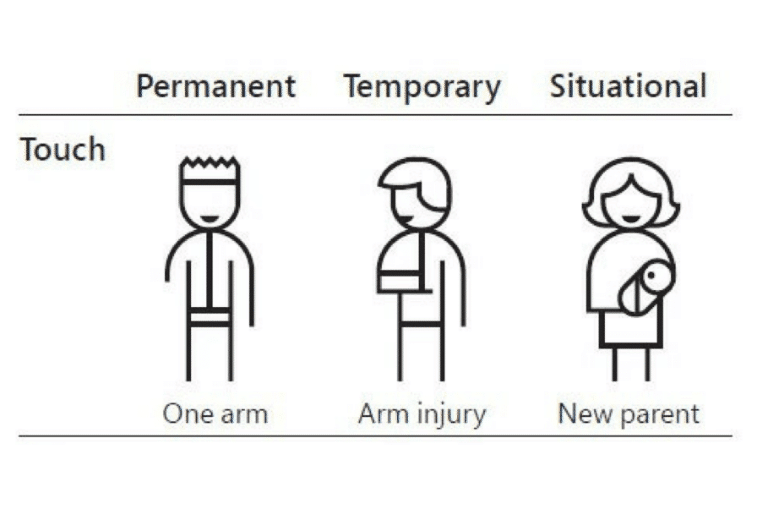Blog
Chapter 4: Web Accessibility is Law, and The Right Thing to Do – New Routeware 2023 Update
by Aidan McLennan • October 30, 2017

Sometimes, technology can surprise even us.
Years ago, we received an unsolicited thank-you email from an older couple who had been really struggling to keep on top of their new waste collection schedule. The email came from a woman with macular degeneration, who described herself as “nearly blind”, and her husband, who suffered from Alzheimer’s disease. Not only were they faced with the challenge of understanding a new and complex collection schedule, but their disabilities added to the difficulty of reading and understanding their calendar and then remembering when to take out the garbage and recycling. For these residents, the waste collection reminder that ReCollect provided was an essential service that made their everyday lives just a little bit easier.
We wanted to share that story, because it’s a really great example of one of the many ways accessible technology can make users of all kinds of happy. Accessible service can have an incredible impact, and we urge anyone considering new technology to evaluate its accessibility.
Impact of Accessible Service
According to recent census data, more than one fifth of the US population reports being affected by a disability. This statistic should have a profound impact on how government provides services to its residents. In the same way that a wheelchair entrance allows people with mobility impairments to access city hall, adhering to web accessibility standards is vitally important to ensuring that residents with many types of disabilities are able to interact with their government online.
The Web Content Accessibility Guidelines (WCAG) 2.0 have become the internationally accepted standard for providing content on the internet in a way that is accessible to people with disabilities. This includes making sure that images have proper descriptions that allow them to be understood by visually impaired residents, or making sure that residents with neurological disabilities that affect their dexterity can easily navigate a government website using a keyboard, when a mouse is too difficult to use.
It is difficult to anticipate the barriers that may be faced by residents visiting your website, but there are some good ways to help eliminate as many as possible. David Berman is an accessibility auditor of government technology solutions. His company, David Berman Communications, tests and certifies WCAG, PDF/UA, AODA, ADA, and Section 508 compliance. We recommend this video for a full introduction of why accessibility really matters.
In this video, David outlines five compelling reasons why you should keep accessibility in mind; in summary:
- There are a lot of people coming online, quickly. While a fifth of these people will have some sort of disability, others will have temporary challenges. This drastically increases the number of people who will benefit from services that keep all abilities in mind.
- Search engines can read your content better if it is accessible. Currently, search engines cannot read images or sound very well. Much of what serves people with different abilities will therefore also help your search engine optimization.
- If you do not provide accessible services, you could be excluding people who would provide incredible value for your organization. Especially in human resources, this argument is a powerful one; if you want the best people to involve themselves with what you do, you have keep the pool of potential candidates as large as possible.
- We all have a social responsibility to be accessible. Governments have extra responsibility.
- Governments are increasingly passing regulation reforms for online accessibility. It’s better to get ahead of these regulations instead of rushing later. Or, use a software tool that is already accessible!
These reasons and more mean that there has never been a better time for us to care about accessibility in our online society.
Accessibility is Not just a Checkbox, but the Checkbox is Important
Is your website visited by residents with disabilities? The answer is definitely yes. This should be enough of a reason to offer accessible tools. But if you need a bit of a nudge, there are consequences for not doing so, too. If you don’t offer accessible tools, they could get shut down by your I.T. department because your service doesn’t meet accessibility requirements.
More and more jurisdictions are passing laws that dictate minimum accessibility standards. As David Berman says, it’s best to stay ahead of these requirements so that you’re never scrambling to beat the law. If you do end up in this scenario, you could be at risk of getting sued by your local accessibility advocacy group.
Change People’s Lives for the Better
In the end, accessibility is not just about meeting some guidelines. It’s about making sure that everyone you provide services to feels supported. With the right tools, you can help someone accomplish something they’ve never been able to do before.
How to Ensure You are providing Accessibility Compliant online services
The best way to ensure that your web technology meets accessibility standards is to have your website audited by an accessibility auditor, such as David Berman.
But if you’re not prepared for an audit right now, then make sure to select vendors who have already gone through an audit process. And remember to request some level of documentation of that audit, or get your IT team to run an assessment. Make sure the vendor has done the work to be accessibility compliant; don’t just take their word for it.
For instance, our tool is regularly audited to achieve Web Content Accessibility Guidelines (WCAG) level 2. For more information about WCAG, please visit: https://www.w3.org/WAI/intro/wcag.